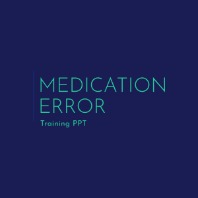Medication Error
Definition
Medication errors, broadly defined as any error in the prescribing, dispensing, transcription and administration of a drug, irrespective of whether such errors lead to adverse consequences or not, are the single most preventable cause of patient Harm.
Medication Error include
- Prescribing Error
- Dispensing Error
- Documentation Error
- Transcription Error
- Indent Error
- Administration Error
Factor contributing the prescription error
- Lack of knowledge of the prescribed drug, its recommended dose, and of the patient details contribute to prescribing errors.
- illegible handwriting.
- Inaccurate medication history taking.
- Confusion with the drug name.
- Trailing zero (e.g. 1·0).
- Inappropriate use of decimal points.
- Use of verbal orders.
- Always precede a decimal point (e.g. 0·1).
- Use of error prone abbreviations (e.g. AZT, OD BD has led to confusion)
Separating drugs with a similar name or appearance (LASA medication).
Keeping interruptions in the medicine administration procedure to a minimum and maintaining the workload of the nurse at a safe and manageable level.
Awareness of high risk drugs such as potassium chloride and cytotoxic agents.
Introducing safe systematic procedures for dispensing medicines in the pharmacy.
Double check of drugs before dispensing by two pharmacist.
Administrative Error
- Discrepancy occurs between the drug received by the patient and the drug therapy intended by the Doctor prescription.
- Errors of omission - the drug is not administered
- Incorrect administration technique and the administration of incorrect or expired preparations.
- Deliberate violation of guidelines.
- Lack of perceived risk.
- Poor role models.
- Lack of knowledge of the preparation or administration procedures.
- Complex design of equipment.
- Not Ensuring the medication is given at the correct time.
- Interruptions during drug Administration.
- Inaccurate recording and transcribing orders.
- Unclear or erroneous labeling of drugs
- Miss identification of client
- Incomplete delivery of drugs
- Verification errors
- Use of inadequate knowledge or inaccurate knowledge base.
- Time based performance pressure
- Near Miss
- No Harm
- Harm
- Sentinel Event
- Right patient
- Right drug
- Right dose
- Right time
- Right route
- Right recording
- Right assessment
- Right education
- Right evaluation
- Right to refuse medication
B. Follow the following steps to prevent Medication error
- Be sure to read labels at least 3 times, before during after administration of the drug.
- Prepare the medicine in a well lighted room.
- Check the expiry date of the drug before administration.
- Be aware about ambiguous orders or drug names and numerical and Consult doctor if any doubt.
- Be alert to usually large dosage or excessive increase in dosage ordered.
- When in doubt, check order with prescriber, pharmacist, literature.
- Double check all calculation, even simple calculation
- Do not allow any other activity to interrupt your Routinely administration of medication to a client.
- Refer to drug interaction charts or drug reference source and commit common interactive drugs to memory.
- Do not use any un standard abbreviation and symbols, question if any one use.
- Read the leaflet of the drug carefully when giving new drug first time.
- Do not make assumptions of illegible orders.
- Do not accept incomplete orders and telephonic or verbal orders.
- Double check with a client who has allergies about all new drugs as they are added in treatment plan



Post a Comment